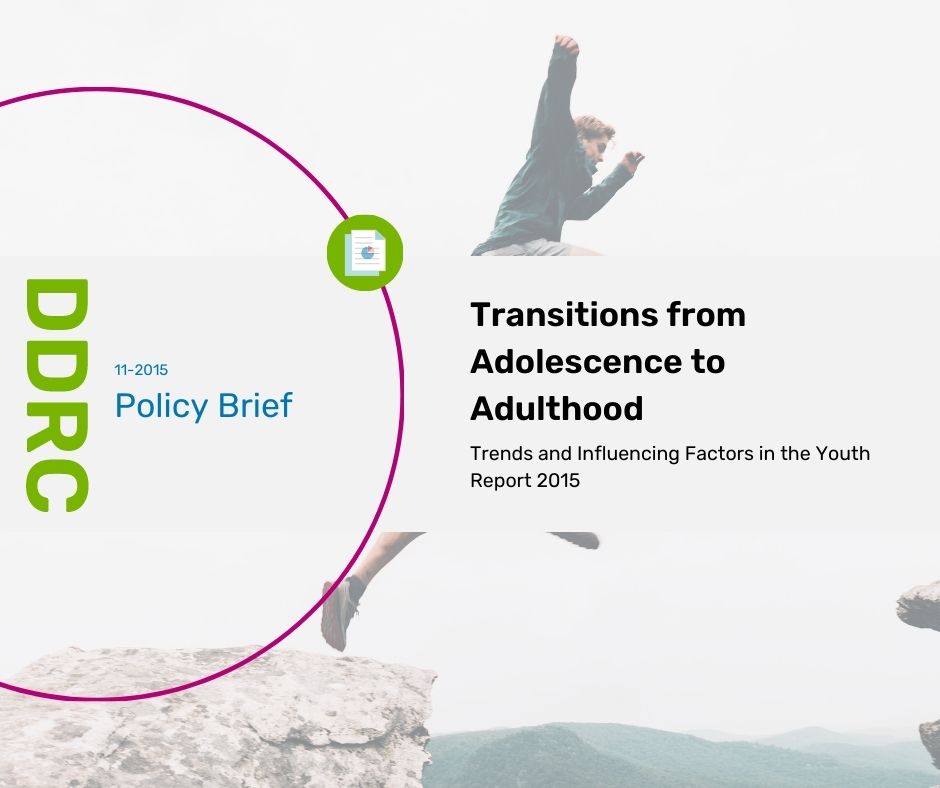Transitions from adolescence to adulthood have changed considerably in recent decades. Compared with the past, it extends over a longer period and is less structured and standardized. There are also considerable differences today in the sequence of transitions to the world of work and in the private sphere, as well as in the development of civic participation. It also became clear that the different transition trajectories of adolescents and young adults can be explained in particular by education, social origin, nationality, gender and the resources available.
Jump to content
Longer transition phases postpone biographical stages such as starting work or starting a family
In recent decades, Luxembourg (as most Western societies) has experienced a significant lengthening of the transition from adolescence to adulthood. This lengthening can be seen in the increasingly late steps in key transition areas: taking up gainful employment, entering into marriage and starting a family now take place much later than they did a few decades ago.
The lengthening of the transition period is generally due to the fact that young people today have to invest more in education and therefore spend a longer time in the education system before they start looking for work. At the same time, entry into the labor market is more problematic today: internships, temporary employment contracts, part-time contracts, repeated unemployment characterize this transition and lead to a prolongation of the transition into work.
The resulting later entry into the labor market is also related to the temporal shifts in the private sphere: For many young people, security in the professional (and thus also financial) sphere is still a prerequisite for purchasing a property and starting their own family. In addition, traditional transition markers to adult status are no longer relevant for all young people and are normative in nature.
Although the majority of young people strive for these transitional events and regard them as important stages in their lives, many also see the transition phase as a time for trying things out, for self-realization and for developing their own ideas about life.
Transitions and biographical trajectories become more diverse
As a result of individualization and social differentiation, there is now a high degree of freedom of choice in biographical decisions and a multitude of possible paths into adulthood. Traditional patterns are losing importance, individualized transitions are increasing. At the same time, however, the greater freedom of choice implies a compulsion to make decisions and is associated with greater uncertainties and risks.
It is often difficult for young people to grasp the consequences that individual decisions can have for their individual biographies. While some adolescents and young adults know how to take advantage of their freedom of choice – for example, by consciously deciding on a particular career path – for others the transition is not without uncertainty, crises and fears.
The extent to which young people know how to use the freedoms and deal competently with the associated demands depends on the one hand on personal resources (including cognitive abilities, social skills, self-efficacy) and on the other hand on support from the social environment (family, friendships).
While some adolescents have very clear ideas about how they want to make transitions to adulthood and succeed in making these transitions without difficulty, other adolescents face numerous difficulties in moving out of the parental home, taking a job, and starting a family. | © Jantine Doornbos via Unsplash
Transition events are more and more decoupled and reversible
The transitions in the various transition areas are not independent of one another, but are in part mutually dependent. For a large proportion of young people, for example, a successful transition into the world of work is a prerequisite for independent living or starting their own family. At the same time, these different transition events, which mark the transition to adulthood, are temporally decoupled from one another:
In contrast to the past, when social norms and conventions, for example, stipulated moving out of the parental home only when marriage was imminent or parenthood could not be seen independently of marriage, various private transition events today are often far apart in time: for example, moving out of the parental home usually takes place well before marriage or starting a family.
Furthermore, transition may have already been successfully completed in one area of life while transition has not yet begun in other areas (e.g., employed young adults still living with their parents). In addition, once transitions have been completed, they cannot be regarded as closed forever; rather, they are increasingly reversible.
An example of this is the situation of academics who move back in with their parents after a phase of living independently during their studies. The loss of a job or a divorce can also lead to young people having to give up their independent living and move back in with their parents.
Marriages are divorced more frequently today than was the case just a few decades ago | © Andres Molina via Unsplash
Adolescents with family support cope better with transitions
Our findings consistently point to the high importance of parental support for positive coping with transition. This support is often lacking for adolescents who are confronted with problems during the transition phase. Individual problems and a lack of a social network then often lead to transitions that require support or even fail.
In contrast, young people with devoted and supportive parents can count not only on their financial help, but also on their experience, knowledge and psychological support. This does not only have an effect during the transition to adulthood, but already plays a decisive role during the school years.
Family support is also an important factor in the transition to independent living. Given the high real estate prices in Luxembourg, most adolescents and young adults rely on their parents for help. However, not all parents have the means to support their children financially or to provide them with housing.
The influence of the family of origin is particularly evident in the development of civic participation: Young people who grow up in a politically interested and involved family are more likely to show an interest in politics themselves and are more likely to develop their own political and social involvement. Parents are not only important role models, but also often specifically encourage their children’s involvement.
Young people who cannot draw on the support and example of their parents are largely disadvantaged. Non-familial support services attempt to compensate for these disadvantages, but they cannot completely replace family support.
In Luxembourg, not all parents can financially support their children. | © P. K. Picture world via Unsplash
Transition trajectories of young women and young men differ
The life courses of young men and young women have converged in recent decades, especially with regard to the structure of educational pathways and occupational activity. Compared with the past, significantly higher proportions of women are employed and return to work earlier and more frequently after the birth of children.
Nevertheless, there are also differences in the transition between the sexes. On average, young women achieve higher educational qualifications than young men and more often have a university degree; accordingly, they remain longer in the education system. Women move into independent living situations earlier, while young men often stay in the parental home longer.
However, women still perform a larger share of private child-rearing and care work, which leads more women to try to cope with the double burden by reducing their professional activities (part-time work).
In terms of social and political participation, however, male adolescents and young adults are more active: girls and young women are less interested in politics than their male peers and are also less involved in clubs and civic organizations.
Women move into independent living situations earlier, while young men often stay in the parental home longer. | © Tim Mossholder via Unsplash
How nationality and migration influence transitions
In all transition areas, clear differences in coping with the transition between young people of Luxembourgish and foreign origin became apparent. Although the findings must be viewed in a differentiated manner, it can be stated that adolescents and young adults without Luxembourgish nationality achieve lower educational qualifications on average than those with Luxembourgish nationality.
Since lack of language skills and social networks are often added to this, the course for the professional future of many young people with a migration background is set early on: Accordingly, young people with a migration background disproportionately often find themselves in occupations with low qualification requirements, are more frequently affected by unemployment and more often have to resort to the help of measures to cope with transition.
Furthermore, the low political interest of youth and young adults with foreign nationality, as well as their lower social and political participation, are striking. Thus, young people with an immigrant background rarely benefit from the strong integrative power of voluntary engagement.
In addition, the data also show a large number of highly qualified, professionally successful and well-integrated immigrants, who, however, are more often from the second generation of migrants and often come from other EU countries.
In Luxembourg, there is both a large group of highly qualified and professionally successful migrants and a group of low-skilled migrants living in precarious conditions. | © Li Jia via Unsplash
The contribution and limitations of support services
For many adolescents and young adults, the existing range of transition support measures in various areas is an important aid in coping with the transition. This is evidenced by the predominantly positive feedback from participants.
In the area of work integration measures, it has been shown that the overwhelming majority of those taking part in the measures rate the increase in knowledge and skills, personal development and improvement in career opportunities as a result of their participation positively. The following four factors have a positive influence on the evaluation:
- the individual tailoring of the measure to the participant,
- the response to the needs of the participant,
- the identification of the participant’s strengths and weaknesses, and
- the individual support of the participant.
Orienting the measures to these factors should therefore also have a positive effect on the success of the measures.
The assisted living structures contribute to an improvement in the residents’ living situation and their ability to cope with everyday life. However, young people sometimes have to wait a very long time before they are offered a place. This indicates the high demand for additional residential structures.
Older adolescents in residential structures with more individual freedom and more opportunities for participation rate the individual benefits of the services higher than young adolescents, who are often confronted with a higher degree of control and rules in their residential structures. Overall, an expansion of participation opportunities would be necessary to strengthen the development of personal responsibility and independence of the residents and thus improve the conditions for a successful transition to independent living.
The offers to promote civic participation are used almost exclusively by young people with Luxembourgish nationality. These services not only have an important social integration function, but also make a significant contribution to the development of a wide range of competencies (including assumption of responsibility, further development of personality and, in some cases, professional competencies). Against this background, it would appear to be very important to open up the programs more to young people with an immigrant background and young people with low educational qualifications.
In addition to the positive effects, the results also point to the limitations of the support services. For some young people, measures prove to be a holding pattern or a dead end and do not lead to the desired improvement in their situation. In particular, young people with multiple problems who are in great need of support benefit only to a limited extent from the existing range of measures, but require more extensive support that is specifically tailored to their needs. What is needed here is improved early identification and more socio-educationally oriented support that also includes the family.









